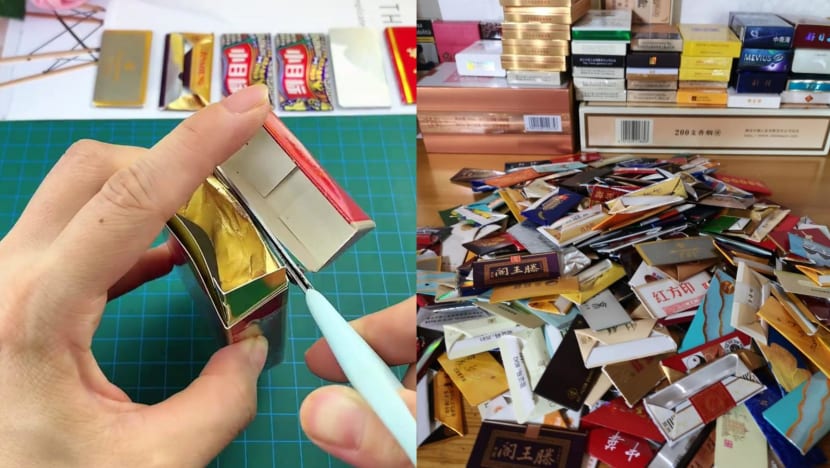China moves to ban ‘cigarette cards’ among minors
The craze has sparked concern by authorities who say exposure to tobacco products could "familiarise children with cigarette brands and create a positive association with smoking".

Cigarette cards, often referred to as "yan ka" or "smoke card" in Mandarin, are made are out of empty or discarded cigarette packs, which are folded into playing cards. (Photos: Xiaohongshu/星星小手工折纸, hoxtxa)
SINGAPORE: Chinese authorities are moving to ban the sale and use of “cigarette cards” by minors, some who have gone to great lengths to acquire used cigarette packs to play the popular schoolyard game.
Consumer protection groups in Beijing and eastern Jiangsu province have called on law enforcement officers and tobacco governing bureaus to “strictly prohibit the sale" of the cards.
In late November, the Chinese Association on Tobacco Control discussed prohibiting and controlling the sale of the cards.
Experts pointed out various ways and means Chinese children and youths could obtain such cards, through unregulated sales on major e-commerce platforms as well as through their family members.
In a statement posted on the WeChat messaging app, the Jiangsu Consumer Council reiterated that cigarette cards were not "simple playing cards" and called for "regular inspections" by schools as well as a crackdown on sales across online platforms and other channels.
"The popularity of the cards not only exposes minors to tobacco, it's also a tool used by unscrupulous merchants to induce youths to become interested in tobacco," the statement read, adding that other "societal problems" could arise.
Speaking to the Shanghai Daily newspaper, Li Enze, vice director and secretary general of the Public Welfare Law Professional Committee at the Chinese Anti-Tobacco Association, condemned the use of cigarette cards, saying they served as “a gateway to tobacco use” for children.
“They familiarise children with cigarette brands and create a positive association with smoking, which can lead to experimentation and addiction later in life,” Li said.

Schools in several Chinese cities like Beijing, Shanghai and Guangzhou prohibit students from bringing the cards to class.
A primary school teacher in Shanghai told the Shanghai Daily newspaper that students were often seen openly trading cigarette cards in hallways, even arguing over them during class.
“It's creating a distraction and fostering an unhealthy interest in cigarette brands,” the teacher said, adding that cards were often confiscated by staff who have raised “serious discussions with parents” about the risks.
WHAT IS FUELLING THE TREND?
Cigarette cards, often referred to as “yan ka” (which translates to “smoke card” in Chinese), are made out of empty or discarded cigarette packs, which are then folded into playing cards.
They are extremely attractive to children and are seen as being cool, experts say.
The more prestigious the brand, the more valuable the card is considered among players.
Cigarette card games were popular in China during the 1970s.
The aim is to compete with others using the best cards by slapping them on the ground to flip over an opponent’s cards.
The winner takes the losing party’s cards.
But while the sale of tobacco and tobacco products to minors is strictly banned in China, children have been known to easily obtain empty cigarette boxes from convenience stores and tobacco shops near schools - often priced cheaply at 1 yuan (US$0.14) a pack.
Some have even gone to great lengths to pick up discarded cigarette boxes found littered on the streets, or searched for them by rummaging through garbage bins.
Chinese media reports have highlighted cases of minors resorting to criminal activities to obtain such cards, like the case of six youths in Sichuan who were arrested in July after they were caught sneaking into a local store to steal high-end cigarettes worth more than 60,000 yuan.
After obtaining the cigarette packs, the teenagers reportedly threw the cigarette sticks away, littering forests and river streams.
Checks by CNA on major Chinese shopping platforms like Taobao found multiple listings of ready-made cigarette cards, available for sale without age limits, on accounts branding themselves as toy stores.
Cards were also seen listed as toys or collectibles, bypassing regulation.
Sellers quoted in Chinese news reports have defended the legitimacy of their products, claiming that they were “completely legal” because they were either “printed matter not cut from boxes” or not containing actual cigarettes.

Smoking is deeply ingrained in many parts of Chinese culture and experts say that China’s multibillion-dollar tobacco industry, the largest in the world, has been unknowingly fuelling the controversial trend.
Chinese news reports have pointed to the problematic nature of “beautiful” cigarette pack designs that play a role in fuelling the craze.
Unlike countries like Australia, Singapore and New Zealand that require cigarette packs to be stripped of flashy imagery and prominently feature graphic pictures and warnings, cigarette packs sold in China continue to serve as portable advertising for global tobacco giants.
WHAT MUST BE DONE?
But while Chinese authorities move to crack down on sales, experts have cautioned against outright “condemnation” and emphasised the need for balanced approaches, as well as more public education efforts to teach children to be aware of smoking harms.
Schools and families should also “strengthen education and guidance” for youths to help them establish correct values and health awareness, experts said.
Yang Jie, a researcher at the Chinese Center for Disease Control and Prevention, supported government moves to “intensify crackdowns” and “severely punish those who break the law”.
Schools and parents should also place more emphasis on guiding and teaching youths, to help them develop “correct values and health awareness”, Yang Jie added.
Speaking to the Shanghai Daily, a counsellor named Yao Mei argued for a more balanced approach, saying an outright ban could likely “drive the cards underground and make them more appealing to children”.
She also suggested promoting other games that encourage positive social interactions, without the associated risks.
“We should focus on understanding why these games are so attractive and offer healthier alternatives,” she said.
“Children are naturally drawn to activities that involve competition and social bonding,” she said. “If we can provide alternative games that fulfil these needs, we can gradually steer them away from cigarette cards.”















